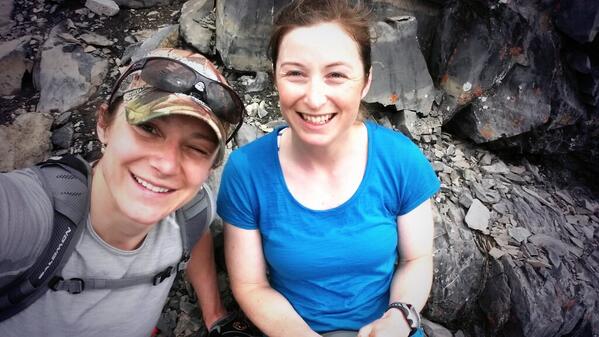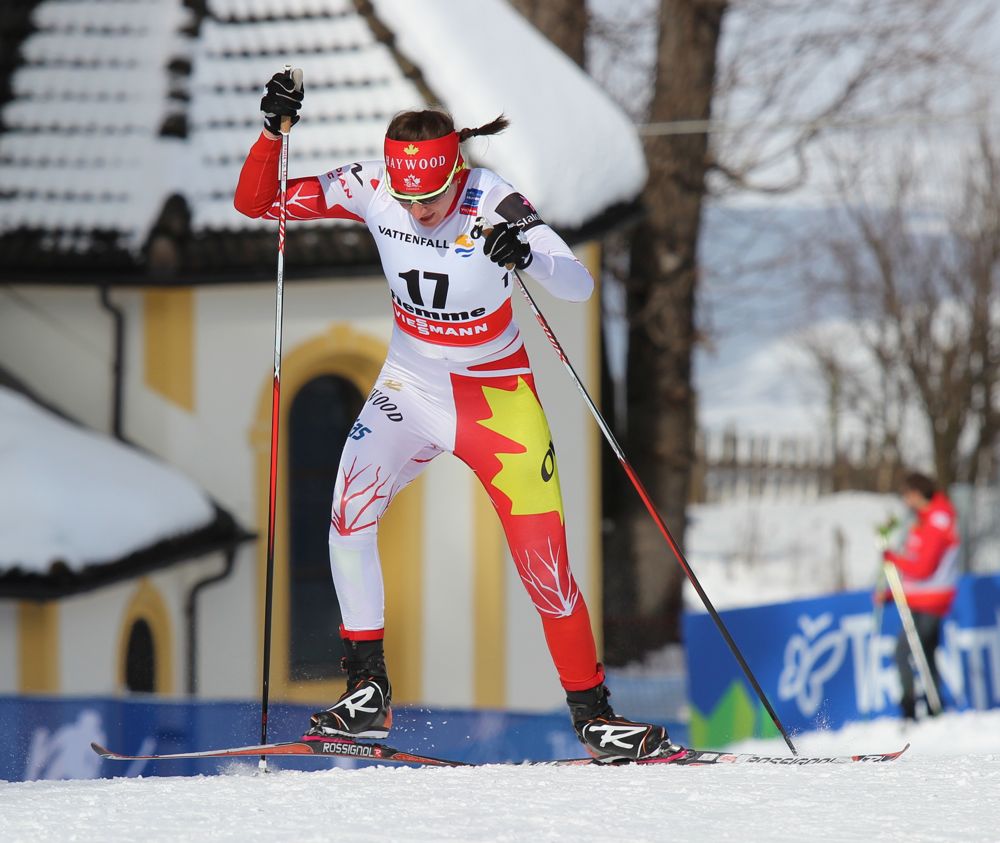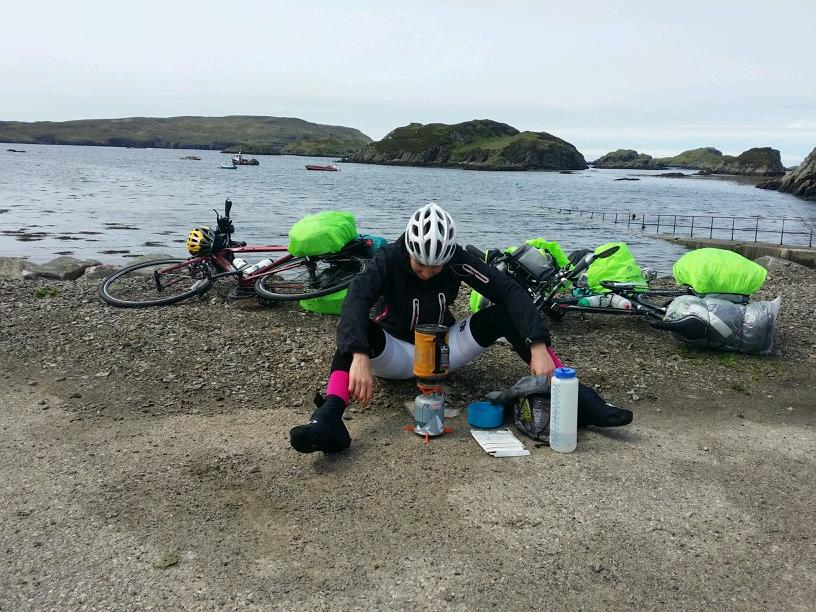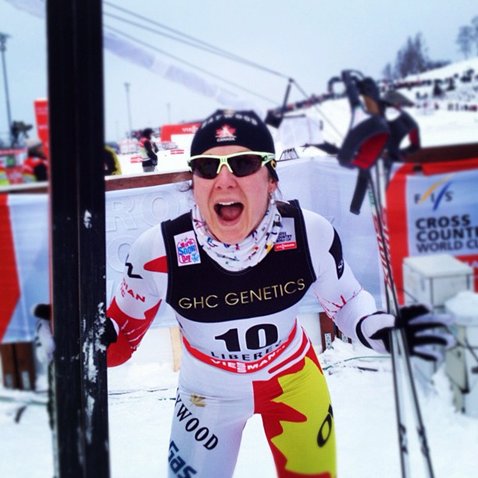
Dasha Gaiazova was on the fence following the 2014 Olympics.The 30-year-old, Russian-born Canadian had competed at back-to-back home Olympics — four years ago in Vancouver, British Columbia, then Sochi, Russia, in February.
Committing four more years to a third Olympics wasn’t in her cards, she reasoned, but she felt compelled to stick around for another season. A skier since age 12 with a small club in Pushchino, Russia, she didn’t know anything different. At 15, she moved to Montreal with her parents and younger brother, joining its SkiÉlite club upon arrival. By 16, she was a Rossignol-sponsored athlete and on the World Cup circuit by age 21.

Spending the better part of the last decade racing internationally, Gaiazova weathered highs and lows like everyone else. In 2008, she discovered she had celiac disease, joined Rocky Mountain Racers (RMR) in Canmore, and made her way back onto the national team before the 2010 Vancouver Games.
And while she said she was “100-percent focused” on racing leading up to the Sochi Olympics, Gaiazova explained on the phone late last month that her mind sometimes drifted.
“Once in a while I would look at university websites and think about what else I wanted to be doing,” she said from her current home base in Canmore, Alberta, near her hometown of Banff.
She settled on what she called a transitional year: “a year to myself and race my heart out and go to World Championships,” she said of the 2015 championships in Falun, Sweden. “My goal was to do that, but also, by the end of next winter, have a solid plan in place for transition.”
What exactly she’d switch to, she wasn’t quite sure. After devoting more than half her life to skiing, she wanted to take some time to research jobs and opportunities.
In May, she went to Scotland with her dad. The two-week bike trip starting in Inverness, up to the Orkney Islands and along the western coast was something she’d been planning for the last three years — first with her then-boyfriend and more recently with her father.

“For the last five years I think I’ve spent less than three weeks with my family,” Gaiazova recalled.
Her dad wasn’t able to watch her in person at the Sochi Olympics, so the two reunited on bikes. Before taking a train ride to Inverness, they met in London, where she first stayed with her best friend, whom she typically visits at the beginning or end of each winter.
“I feel like I have a lot of connections with England and always wanted to go to Scotland,” Gaiazova explained. “I thought, after the Olympics, I really want to go this year; it’s got to be now or never … and my dad wanted to come. He wasn’t really a scotch lover, but is now.”
The two camped along the way with what Gaiazova described as “a crazy Russian sort of setup. I carried all of the gear.”
And as fun as it was, it involved tying up some loose ends.
“It was a bit of a soul-searching trip for me because I wanted to sort of be honest with myself and see what I wanted to do,” Gaiazova said. “If I wanted to ski race or if it was time to leave that in the rear view and do something else.”
World Cup Breakthroughs
Two seasons ago, a year out from the Olympics, Gaiazova put down a string of career bests: in January 2013, she advanced to her first World Cup sprint final in Liberec, Czech Republic, to place fourth overall in the classic sprint. Less than a month later at the Sochi World Cup, she and teammate Perianne Jones teamed up for bronze in the classic team sprint — an event Gaiazova and Chandra Crawford also took third in three years earlier at the Düsseldorf World Cup in Germany.

Seventh in the freestyle team sprint at the 2010 Olympics, Gaiazova and Jones went on to place 11th in the classic team sprint at the Sochi Games. She finished 22nd in the individual classic sprint in 2010 in Vancouver, and was 25th in the skate sprint in Sochi.
After nearly 100 career World Cup starts, Gaiazova found herself in 40th in the overall Sprint World Cup standings for 2013/2014. She rose as high as 17th overall in the world the season before.
Without a result within Cross Country Canada’s 2014/2015 national-team-selection guidelines (one top 6 or two World Cup top 12’s in either sprint or distance, or twice in the top 12 in a combination of a sprint and a distance race), she didn’t make Canada’s Senior World Cup Team this season.
On May 4, she tweeted that she hadn’t met the Senior Development Team standards, either, which she called, “worse than my worst-case scenario…”
“I didn’t see that coming,” she said. “I thought I would make the team so it was a bit of a surprise.”
A few days later, she flew to Russia. Reasoning that Scotland was two-thirds of the way to her homeland, Gaiazova spent a week in there first, catching up with family — like her grandmother and cousin — and friends.
During her multi-nation vacation this spring, Gaiazova had planned to resume training with her former club and coach in Canmore: RMR and head coach John Jaques. In late March, she won her last sprint of the season at Canadian Nationals and subsequently started training for next winter in April.
“I felt like I wanted to keep racing,” she recalled. “The team got announced and I didn’t get on the team, and I was like, I gotta think about some things.”
She spent some time talking to her sponsors, friends and former coaches about whether she should continue racing. In Scotland, some discussions with her dad and hours in the saddle led Gaiazova to her ultimate decision, which she announced in mid June.
“Basically, it was like me on the bike and my dad on the bike and nothing else, not even trees,” she said. “Spending those hours thinking about my career and my passion and what else I want to do in life, it became clear that it was a good time to retire. This whole trip came together really nicely. … I’m happy I spent some precious time with my dad, that was important, and had this transitional moment.”
And Gaiazova knew that once she made up her mind, she wouldn’t change it.
“It’s a big decision; it’s all I’ve done all my life up to this point,” she said. “They call it retirement, you really step away from what you’ve done and it’s a big decision process.”
“Spending those hours thinking about my career and my passion and what else I want to do in life, it became clear that it was a good time to retire.” — Dasha Gaiazova
Life After Racing
As for what’s next, she wasn’t entirely sure. “‘I’m still looking at school options and job options,” she said. “I just updated my resume … that was fun. … Looking at coaching options.”
While she’d love to see more Canadian coaches in CCC’s pipeline, Gaiazova wasn’t sure that was the route for her. Coaching is on her list of “short-term things to do,” she explained. “I want to coach kids and I think I have something to offer and inspire … I just think it’s already so expensive for the kids. I’d like to be a volunteer.”
“Looking back on my career as an athlete and Olympian I think that’s the greatest opportunity that I have: my passion … and I want to pass that onto kids.”
She’s also seeking something she can apply herself to for the next 10 to 15 years, possibly related to science, finance or business.
“I’m thinking maybe run my own business and I’m taking my time to figure that out,” she said.
For the time being, she’ll continue to live in Canmore while renting her place in Banff. Two years ago, Gaiazova found herself dealing with a financial predicament that’s familiar among top North American nordic elite skiers.
“I finished my season and I was $12,000 dollars in debt,” she said.
That had accumulated in two years while Gaiazova was living in Banff with “expenses well beyond my means,” she explained. For the last two years she’s been renting her place and putting the proceeds toward her current lease — with a lower cost of living in Canmore.
“I got really good at budgeting and really good at personal finance,” she explained.
And while she had some hurdles, Gaiazova said she thinks athletes today have it tougher. At 20 years old, she was on the national development team with a good chunk of her expenses covered.
“I’m an immigrant child — my parents moved to Canada in ’99 with literally nothing,” she said. “I got really lucky. I had amazing coaches and amazing sponsors … the national team was paying for travel.”
Skiers today often have to work full time to pursue their athletic dreams, Gaiazova said, acknowledging that it’s still possible to achieve their goals. For that reason, she plans to keep hopping into workouts with up-and-comers like Olivia Bouffard-Nesbitt (RMR).
“Development is so important,” Gaiazova said. “Starting from Fast and Female years ago and just trying to be involved with kids as much as I can, even being in Quebec [with the Pierre-Harvey Training Centre last season] training with those young girls. … Looking back on my career as an athlete and Olympian I think that’s the greatest opportunity that I have: my passion … and I want to pass that onto kids.”
And she’s also taking time to enjoy pastimes like hiking with former teammates like Andrea Dupont, also of RMR.
“I feel like this is good and I’m excited,” Gaiazova said.
Alex Kochon
Alex Kochon (alexkochon@gmail.com) is a former FasterSkier editor and roving reporter who never really lost touch with the nordic scene. A freelance writer, editor, and outdoor-loving mom of two, she lives in northeastern New York and enjoys adventuring in the Adirondacks. She shares her passion for sports and recreation as the co-founder of "Ride On! Mountain Bike Trail Guide" and a sales and content contributor at Curated.com. When she's not skiing or chasing her kids around, Alex assists authors as a production and marketing coordinator for iPub Global Connection.




One comment
Martin Hall
July 18, 2014 at 10:58 am
Wrong decision—that’s what I think—she is a fantastic technical classical skier and all right in skating—she just needs to get with a good coach—-do the international hours she should be doing, train with international level xc training partners and race a true racing schedule—her last 2 years for sure her racing schedule has only been half of what it should have been—she is never in real racing shape because she races so little internationally and domestically.
Too bad for her and the Canadian program—she could be a leader for both—-she is realizing this as she quits—it’s not too late!